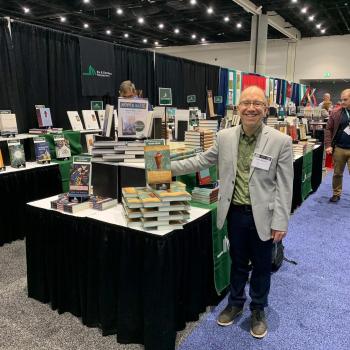I have a confession to make. While I like travelling, and appreciate seeing people face to face, I don’t miss in-person conferences the way others seem to, and am not particularly eager for this longstanding academic practice to get back to “business as usual.”
This isn’t because I am an introvert. It is one of the most remarkable positive experiences in my life that, for quite some time, when attending in-person conferences, people have come up to me and started conversations with me when they read my name tag, saying in most instances that they read my blog. This started happening long before I had written enough books and articles to have that kind of name recognition as a result of more traditional print publishing. I often say that blogging is a superpower for introverts. But even so, academics teach, and so even if we are introverts and it never feels entirely comfortable to do so, we are capable not only of starting conversations, but of being the one to start things in a room full of complete strangers. We do that at the start of every semester. I and my fellow introverts can cope with the socializing even if we don’t miss it as much as extroverts do. Indeed, we are probably more comfortable than extroverts are when we arrive at a reception and do not know anyone, or don’t find anyone we know who is not actively engaged in conversation already. But the receptions and things like that, as nice and even as practically useful as they can be, are not a good enough reason for academics to travel long distances, especially with current technology the way that it is. I recognize that the in-person conference is like the browsing of the physical bookshelf or the card catalog in the library of the past. Things are discovered by happenstance that would not have been otherwise. But that isn’t an argument for not embracing the benefits of digital catalogs, books, and articles. We may need to try to find ways to ensure the benefits of the older way of doing things are not lost entirely, but newer ways of doing things often offer advantages that outweigh the disadvantages.
The reason I am hopeful that we can continue to make online conferences the norm is accessibility. I have had a number of speaking engagements since the pandemic that might still have occurred in other circumstances, but the fact that I could just join a class or seminar or give a lecture on Zoom has made things so much easier. And I know that many people around the world will be in the audience of my upcoming lecture on Christianity in science fiction who would not have been able to get to the University of Michigan in person on April 15th. I have attended more conferences than I could have gotten to in person over the past year, and I know that among the attendees were people who were excluded from past conferences by the fact that international travel was not affordable to them. Whole parts of the world are underrepresented at each and every major academic conference as a result of location and economic disparity. If we always held conferences in locations that were advantageous to those who are in that category, this might be less of an issue. But we hold them in North America and Western Europe for the most part. Australians and New Zealanders are forced to deal with extremely long flights and dramatic time change in order to attend. Now, some might have to stay up all night to attend a remote conference. But doing that occasionally and spreading the timing around equitably in online conferences could at least potentially be fairer than the way we have become accustomed to doing things.
Accessibility is also a major issue for people with various disabilities. Some of those are visible and may come to mind. I hope that we would never contemplate having a conference at a venue that people with mobility issues could not navigate. We ought to do better than we do, however, not just at conferences but in classrooms and in our dissemination of our scholarship, when it comes to the access for people with vision impairments, hearing impairments, dyslexia, and many other conditions. I recently tried out the Speechify app on my phone, and am really excited about the possibility that I might be able to take a photo of a page in a book I am reading and continue “reading” it while driving between home and campus. Yet the result is not always consistent and some words may get garbled. If I had to rely on a screen reader all the time, I would miss a lot. When will audio versions of just about everything become par for the course? I realize that I am writing this by typing and not recording a reading of what I write here. It would take a major adjustment of how we do things to get all the way to the ideal. But when things are typed and in digital form, if they are formatted and labeled correctly, a “screen reader” can do a good job for those who need it.
(I also really enjoyed getting to hear Esau McCaulley read his own book, Reading While Black, as I have been listening to it in the car lately. The book is fantastic, by the way, and I highly recommend it! I love that I can just check an audiobook out of my public library and get it straight to my phone on the Libby app. McCaulley’s reading of the text as provided by my library’s audiobook includes some places where he stopped and repeated something. Even in this bestseller, the publisher did not provide as careful editing of the audiobook as they did the print edition. There is inequity here, audible even when it is so ironic, in the case of a book that is addressing inequities.)
Those who suffer from disorders of the immune system are more at risk at every large conference. These gatherings are notorious as what we now call superspreader events. Most of us didn’t care about the significant risks being taken by those who braved them when the biggest risk was seasonal flu (which I might add is nothing to scoff at). As academic organizations try to return to in-person meetings as soon as possible, the needs of such scholars is not in view to the extent that it ought to be. For those of you who are academics, there is a letter to the American Academy of Religion and the Society of Biblical Literature addressing this that you will likely want to sign.
We have seen that we can have really good, even better, conferences using tools like Zoom than we do in person. Some have been much worse, to be sure, but hopefully you realize that they don’t have to be, and hopefully you don’t have an idealized nostalgia for conference-going that forgets how often the sessions you attended were typified by papers that were of mixed quality and none of which was worth the cost to you and/or your university of getting you there. We have seen Zoom work in the classroom well enough that it can at least make a second-best experience available to students and faculty who cannot be present in the classroom. We have also seen how often the ways that even mediated classrooms are set up is less than optimal. Sometimes the placement of the camera, or the fact that there is only one, prevents us from doing things that we could that would be even better. Even so, having a student who cannot risk being present in the classroom or who is recovering from an injury or whatever else join remotely is “better than nothing” in most instances.
It is a major issue at all the usual conference venues for the AAR and SBL that providing audiovisual equipment is not a given. It has to be arranged for and paid for on a case by case basis. At the very least, our organizations and other academic groups need to insist that if we are to have large in-person meetings going forward, we demand that there be a way for people who have registered for the conference to participate remotely. By this I mean both presenters and attendees. We can emphasize that we need this infrastructure built in to the rooms and halls where talks are given. We can emphasize that we need to use technology so that whether in-person or remote, those listening can ask questions. Even if not every question can be answered on that occasion, the presenter will benefit from having them all in text form, the use of an app-based system will make the Q&A both more equitable and more interesting, and there is also the potential for useful discussion about and around presentations that is preferable to when it happens on Twitter unbeknownst to the presenter and session presider.
For all these reasons, I am not looking back to returning to “business as usual.” We have learned a lot from the pandemic experience about what is possible and about what is sub-optimal in the way we have become accustomed to doing things. Let’s make a new normal instead of returning to the old one. Let’s do better.













